
A fuel cell is an electrochemical cell that converts the chemical energy of a fuel and an oxidizing agent into electricity through a pair of redox reactions. Fuel cells are different from most batteries in requiring a continuous source of fuel and oxygen to sustain the chemical reaction, whereas in a battery the chemical energy usually comes from metals and their ions or oxides that are commonly already present in the battery, except in flow batteries. Fuel cells can produce electricity continuously for as long as fuel and oxygen are supplied.

This is a timeline of transportation technology and technological developments in the culture of transportation.

A hydrogen vehicle is a type of alternative fuel vehicle that uses hydrogen fuel for motive power. Hydrogen vehicles include hydrogen-fueled space rockets, as well as automobiles and other transportation vehicles. Power is generated by converting the chemical energy of hydrogen to mechanical energy, either by reacting hydrogen with oxygen in a fuel cell to power electric motors or, less commonly, by burning hydrogen in an internal combustion engine.

A zero-emissions vehicle, or ZEV, is a vehicle that never emits exhaust gas from the onboard source of power.

A fuel cell vehicle (FCV) or fuel cell electric vehicle (FCEV) is an electric vehicle that uses a fuel cell, sometimes in combination with a small battery or supercapacitor, to power its onboard electric motor. Fuel cells in vehicles generate electricity generally using oxygen from the air and compressed hydrogen. Most fuel cell vehicles are classified as zero-emissions vehicles that emit only water and heat. As compared with internal combustion vehicles, hydrogen vehicles centralize pollutants at the site of the hydrogen production, where hydrogen is typically derived from reformed natural gas. Transporting and storing hydrogen may also create pollutants.
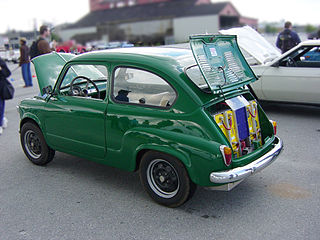
In automobile engineering, electric vehicle (EV) conversion is the replacement of a car's combustion engine and connected components with an electric motor and batteries, to create an all-electric vehicle.

A hydrogen station is a storage or filling station for hydrogen. The hydrogen is dispensed by weight. There are two filling pressures in common use. H70 or 700 bar, and the older standard H35 or 350 bar. California no longer requires that hydrogen stations carry H35, so this standard is becoming obsolete.
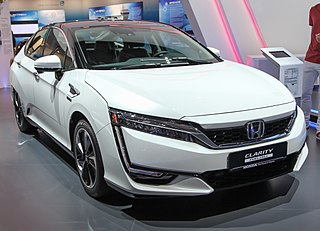
The Honda Clarity is a nameplate used by Honda on alternative fuel vehicles. It was initially used only on hydrogen fuel-cell electric vehicles such as the 2008 Honda FCX Clarity, but in 2017 the nameplate was expanded to include the battery-electric Honda Clarity Electric and the plug-in hybrid electric Honda Clarity Plug-in Hybrid, in addition to the next generation Honda Clarity Fuel Cell. Production of the Honda Clarity ends in August of 2021, with US leases for the fuel cell variant available in 2022.
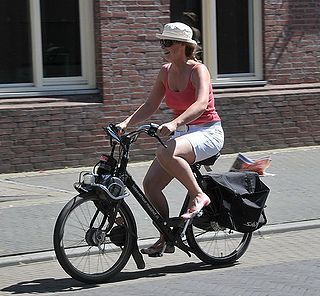
A motorized bicycle is a bicycle with an attached motor or engine and transmission used either to power the vehicle unassisted, or to assist with pedalling. Since it sometimes retains both pedals and a discrete connected drive for rider-powered propulsion, the motorized bicycle is in technical terms a true bicycle, albeit a power-assisted one. Typically they are incapable of speeds above 52km/h.

An electric bicycle, also known as an e-bike or ebike, is a bicycle with an integrated electric motor used to assist propulsion. Many kinds of e-bikes are available worldwide, but they generally fall into two broad categories: bikes that assist the rider's pedal-power and bikes that add a throttle, integrating moped-style functionality. Both retain the ability to be pedaled by the rider and are therefore not electric motorcycles.
Hydrogen technologies are technologies that relate to the production and use of hydrogen. Hydrogen technologies are applicable for many uses.
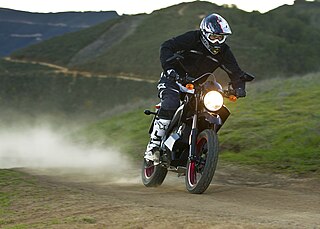
Electric motorcycles and scooters are plug-in electric vehicles with two or three wheels. The electricity is stored on board in a rechargeable battery, which drives one or more electric motors. Electric scooters have a step-through frame.

An alternative fuel vehicle is a motor vehicle that runs on alternative fuel, an energy other than traditional petroleum fuels ; and also refers to any technology of powering an engine that does not involve solely petroleum. Because of a combination of factors, such as environmental concerns, high oil prices and the potential for peak oil, development of cleaner alternative fuels and advanced power systems for vehicles has become a high priority for many governments and vehicle manufacturers around the world.
Hydrogen Electric Racing Federation (HERF) is a racing organization for hydrogen fuel cell-powered vehicles, announced on January 10, 2007. HERF was founded by Peter M. DeLorenzo, who also acts as the league's president and CEO.
The Honda FCX is a family of hydrogen fuel cell automobiles manufactured by Honda.

A battery electric vehicle (BEV), pure electric vehicle, only-electric vehicle or all-electric vehicle is a type of electric vehicle (EV) that exclusively uses chemical energy stored in rechargeable battery packs, with no secondary source of propulsion. BEVs use electric motors and motor controllers instead of internal combustion engines (ICEs) for propulsion. They derive all power from battery packs and thus have no internal combustion engine, fuel cell, or fuel tank. BEVs include – but are not limited to – motorcycles, bicycles, scooters, skateboards, railcars, watercraft, forklifts, buses, trucks, and cars.
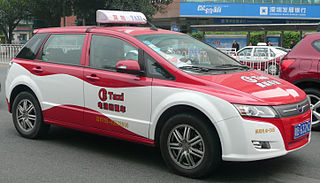
China is both the largest manufacturer and buyer of electric vehicles in the world, accounting for more than half of all electric cars made and sold in the world in 2018. China also makes 99% of the world's electric buses.

Intelligent Energy is a fuel cell engineering company focused on the development and commercialisation of its PEM fuel cell technologies for a range of markets including automotive, stationary power and UAVs. It is headquartered in the UK, with offices and representation in the US, Japan, Korea, and China.

The Toyota Mirai is a mid-size hydrogen fuel cell vehicle (FCV) manufactured by Toyota, and represents one of the first FCV automobiles to be mass produced and sold commercially. The Mirai was unveiled at the November 2014 Los Angeles Auto Show. As of December 2019, global sales totalled 10,250 Mirais. The top-selling markets were the U.S. with 6,200 units, Japan with 3,500 and Europe with 640.
















